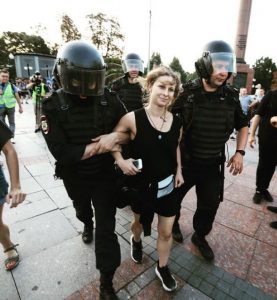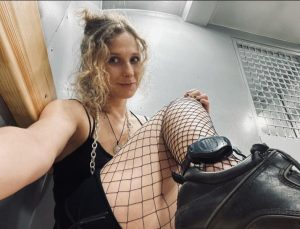Maria “Masha” Alekhina is a Russian artist, writer, political activist and founding member of the famed punk band Pussy Riot. Masha was imprisoned for two years in response to Pussy Riot’s 2012 ‘punk prayer’, Virgin Mary, banish Putin and recognized as a political prisoner by Amnesty International. She served her prison sentence at a remote penal colony (labour camp) in the Ural mountains, where she became a vocal advocate for prisoners’ rights, going on hunger strike, and winning three cases which she brought against prison administration. In 2017, Masha published Riot Days (Penguin Books UK) which was received to great acclaim. The book was based on Pussy Riot’s punk prayer and subsequent experience in the labyrinthine Russian penal system. A punk manifesto for freedom, it has since been translated into eight languages.

Russian artist, writer, political activist and founding member of the famed punk band Pussy Riot, Maria ‘Masha’ Alekhina
Masha has spoken on human rights and prison reform in Russia at the US Congress, European Parliament and the British Parliament among others, and has appeared on stage with world leaders including Bill Clinton. Masha was the recipient of a Lennon Ono Grant for Peace and appeared as herself on the third season of award-winning Netflix political drama House of Cards.
Art is just one component of Pussy Riot’s mission. Shortly after her release in December 2013, Masha and fellow Pussy Riot member Nadya Tolokonnikova announced the creation of Mediazona, an independent news service and media outlet. Mediazona is a censorship-free independent Russian media agency focused on law enforcement issues such as prison conditions and the prosecution of political activists. Pussy Riot activists continue to advocate for broader prison reforms in Russia and provide legal and other forms of assistance to those in the Russian prison system.
As a performer, Masha has worked with the Belarus Free Theatre to produce Burning Doors, a play about violence, tortures and the search for inner freedom. The play was part of a human rights campaign to free the Ukrainian director Oleg Sentsov, sentenced to 20 years in prison in Russia. Burning Doors was included on the New York Times’ Best Theater of 2017 list.
After her prosecution and time in prison, Masha took the decision to stay in Russia and carry on with her art and activism. She has been violently attacked several times by paramilitary groups in league with Vladimir Putin’s administration since then and continues to be a victim of unrelenting police repression. All her bank accounts have since been blocked, for example. Just as her Riot Days show was meant to tour the world, Masha was prohibited from leaving Russia for a year. She dodged the ban, going through with the tour and travelling to every continent to stage over 150 performances around the world. The play was received with critical praise and won three awards at Edinburgh’s renowned Fringe Festival.

Masha was arrested in January 2021 and sentenced to one year ‘restricted freedom’ later that September.
Maria Alekhina was arrested in January 2021 for a tweet promoting protests in support of jailed Kremlin critic, Alexei Navalny, which the authorities had forbidden on ‘sanitary’ grounds (Covid-19). In what has come to be known as the Sanitary Case, Moscow’s Tverskoy District Court issued an order of pre-trial detention under house arrest on January 29, 2021. This was later renewed by the Basmanny District Court on March 18 and again by the Moscow City Court on April 8. It was further extended on June 16 for another 6 months. In addition to these arbitrary judicial histrionics, on June 22, Alekhina was slapped with 15-day of ‘administrative detention’ in a closed prison. On release, she was immediately rearrested outside the prison gates, and given another 15 days administrative detention on new trumped-up charges. Finally, Masha was sentenced to one year of ‘restricted freedom’ – a complicated regime restricting her daily sorties, her online communications, travel and other activities, clearly designed to avoid the term ‘house arrest’ – on 10 September, 2021.

Masha is also a member of Artists at Risk (AR)’s International Advisory Council
Masha, who is a member of the Artists at Risk (AR) International Advisory Council, was declared Artists at Risk (AR)’s first Resident Prisoner in late 2021. This symbolic designation means that Artists at Risk (AR) reaches beyond the material support usually offered, to honour a persecuted artist who can neither legally be supported financially nor hosted physically at an AR-Residency. In Masha’s case, a residency-stipend would automatically make her a ‘foreign agent’ under Russian law. Furthermore, she does not wish to leave Russia, but could not do so in any case, as her passport has been confiscated. She remains under house arrest in Russia.
Related at AR:
- Maria “Masha” Alekhina placed on Wanted list
- BREAKING NEWS: Maria “Masha” Alekhina jailed, days before giving keynote at “Institutions and Resistance – Alliances for Art at Risk”
- Russian “Memorial” and Masha Alekhina – AR stands in Solidarity
- #AlliancesforArtatRisk Participant 6. Masha Alekhina
- Masha Alekhina of Pussy Riot designated first “Artists at Risk-Resident Prisoner”
- #RiskandRebellion Participant 47. Masha Alyokhina
- Masha Alekhina & Yulia Tsvetkova on International Women’s Day 2021
- AR-Resident Veronika (Nika) Nikulshina
- AR-Resident Anna (Anya) Kuzminykh
- AR-Resident Alexander (Sasha) Sofeev
- Russian “Memorial” and Masha Alekhina – AR stands in Solidarity
External Links:
- Amnesty International UK- Pussy Riot
- Riot Days: A Memoir of Punk Protest and Prison Activism
- Theater Review: Burning Doors Is a Fiery Anti-Torture, Anti-Putin Scream
- Prominent supporters of Alexei Navalny face ‘indefinite’ house arrest
- Pussy Riot’s Maria Alyokhina Sentenced Over Navalny Protest Calls